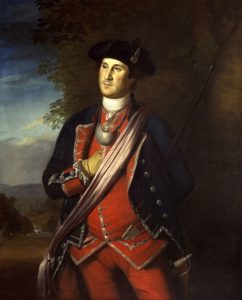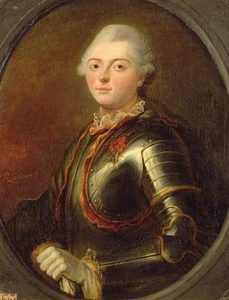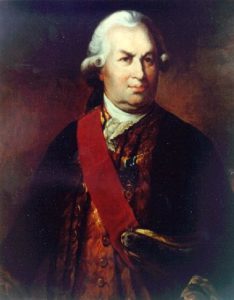by Tom Shachtman
In Paris for Bastille Day, President Donald Trump said, “France is America’s oldest ally. A lot of people don’t know that,” and added, “France helped us secure our independence, a lot of people forget.”
My new book, How the French Saved America: Soldiers, Sailors, Diplomats, Louis XVI and the Success of a Revolution, will bring us further down the road to appreciating the extent and the importance of that alliance, and its lessons for today’s world.
It wasn’t a perfect love affair; each partner knew, going in, that it had more to do with convenience than with passion, and that if their interests diverged their bond might crumble.
Even so, it functioned remarkably well under stress.

An initial crisis arose in attempting to get together while the Americans were still rebellious British subjects. Both Americans and French had reasons to be wary, dating back to the French and Indian War—George Washington was known in France as the “assassin of Jumonville” for his role in the death of that French soldier in 1754.
But well before the Declaration of Independence, the Americans and the French strove to jointly lessen Great Britain’s power. In December 1775—as I recount in an opening chapter that early readers liken to a spy novel—a clandestine emissary from Versailles assured Benjamin Franklin in Philadelphia that France would do more than wish Americans well.
And so when Silas Deane arrived in Paris in the summer of 1776, he was able to obtain war matériel, seasoned officers, and priceless cannon—all, while France continued to deny to Great Britain that it was helping the Americans.
France needed to distract Britain and gain time to rebuild its navy before getting into a direct confrontation. That was why for nearly a year after Franklin’s arrival in Paris, he, Deane, and Arthur Lee were kept dangling, fed just enough promises and loans to keep them from going to London to settle a peace. Only after French naval parity had been reached, and the American victory at Saratoga had convinced Louis XVI that he wouldn’t be backing a loser, did real negotiations begin.
Agreement on Franco-American treaties went rapidly, because, as Franklin told his French counterpart, he saw “nothing therein that was not noble and just.” France committed to guarantee to “establish the Liberty, Sovereignty, and Independency absolute and unlimited of the United States as well as in Matters of Government as Commerce.”

A significant test of the alliance came in the summer of 1778 in conjunction with the fleet of Admiral Hector d’Estaing, which had been sent to America. Just the rumor of its appearance chased the British from Philadelphia.
But a military alliance is only as good as the military that backs it up, and d’Estaing, after refusing to try to pass the sandbar at Sandy Hook to attack New York, as Washington had hoped, aimed at Newport. There his miscues and those of John Sullivan, the American general, combined with the sudden appearance of a large British fleet, plus an unexpected hurricane, made for a debacle, after which d’Estaing’s tattered fleet sailed to Boston for repairs.
Sullivan, incensed wrote a letter to d’Estaing and also sent it to in several newspapers. D’Estaing underlined its most offensive words: “hitherto esteemed allies.” This acrimony could have spelled the end of the alliance. But Washington acted as the only adult in the room, writing to Lafayette,
I feel myself hurt also … at every illiberal and unthinking reflection … cast upon Count d’Estaing … It is in the nature of Man to be displeased with every thing that disappoints a favourite hope or flattering project, and it is the folly of too many of them, to condemn without investigating circumstances.
Congress agreed, voting d’Estaing a letter of thanks, and he promised to return in 1779. Baron von Steuben then summed up the fiasco, in a note to France’s plenipotentiary in Philadelphia that I discovered in the French diplomatic archives, and which we are publishing for the first time, “America has declared herself independent and France has recognized that independence, but it seems to me that neither one nor the other has taken solid enough measures for the conservation of that title.”
Additional strain on the alliance came from d’Estaing’s even more disastrous loss at Savannah in 1779.
General Jean-Baptiste Donatien de Vimeur, Comte de Rochambeau had learned the lessons of those failures when he landed with 6,000 troops in Newport in July 1780—the town had been voluntarily vacated by the British. He worked to charm the local populace, spending lavishly and having his soldiers set examples of professionalism and courtesy.
More strain came when young John Laurens arrived in Paris in the spring of 1781 to ask Louis XVI for larger loans, threatening that if they were not given the U.S. would enter peace negotiations. Foreign secretary Vergennes was incensed over Laurens’ insouciance and his going around him directly to the king, but Franklin understood that Laurens’ rudeness enabled him to play good cop to the young man’s bad cop. It worked. They extracted the largest French loans ever sent to America.

In late summer 1781, when Admiral Francois Joseph Paul de Grasse sent word that he would not come to New York to help attack that target, long favored by Washington, but instead would go to Yorktown, Virginia, it was Washington’s turn to demonstrate extreme graciousness. Accepting the decision, he set both his and Rochambeau’s armies on course for Yorktown and, once there, yielded to him direction of the siege, since Rochambeau had previously conducted fourteen sieges and knew how to best force Cornwallis to surrender.
During peace negotiations the Franco-American alliance began to fall apart, perhaps inevitably so, for once independence had been won each country had to pursue its own interests. France pushed for Great Britain to retain Canada, Nova Scotia and Newfoundland—New Englanders had wanted those to become American—and for Spain to maintain control of Florida and the lower Mississippi. Vergennes’ hidden motive, which he told his envoy never to reveal, was to constrain the United States in territory and place enemies on its borders, to prevent America from becoming a colossus. And the American peace negotiators disobeyed a specific order from Congress—to settle nothing without Vergennes’ express approval—and ditched France to deal one-on-one with Great Britain. Had our commissioners not decoupled from France and acted independently, the United States of America would have been a far smaller country.
TOM SHACHTMAN has written or co-authored more than thirty books, as well as documentaries for ABC, CBS, NBC, PBS, and BBC, and has taught at New York University and lectured at Harvard and Stanford. He is a former chairman of The Writers Room in Manhattan, a trustee of the Connecticut Humanities Council, a founding director of the Upper Housatonic Valley National Heritage Area, and is currently a consultant to the Alfred P. Sloan Foundation’s science and technology initiatives. Tom is the author of Gentleman Scientists and Revolutionaries and How the French Saved America.
